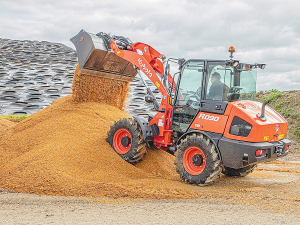Carrfields expands South Island footprint with Agricentre South Kubota dealership acquisition
Two of the South Island’s agricultural machinery dealers are undertaking strategic changes designed to deliver even greater specialist support to farmers.
 Kubota has announced that its new tractors are suited to running on hydrotreated vegetable oil (HVO).
Kubota has announced that its new tractors are suited to running on hydrotreated vegetable oil (HVO).
While we have become accustomed to vehicle manufacturers offering alternative fuel sources for its ranges, other than New Holland with its commercially available T6 Methane tractors, the agricultural landscape is firmly fixated on diesel power.
With the realisation that current battery technology does not lend itself to agricultural situations, tractor manufacturers have looked a little more closely at alternative fuels to power their compression ignition (CI) engines. Kubota is the latest to announce that its new tractors are suited to running on hydrotreated vegetable oil (HVO).
The company has also confirmed that it is possible for its new dieselengine tractors to run on both HVO and GTL (gas to liquid) which will contribute to a lower carbon footprint for Kubota IC engines.
As a manufacturer of industrial engines, tractors, grounds care and construction equipment, Kubota has realised that HVO, which is synthesised from vegetable oil and fat, is likely to become increasingly popular due to its environmental benefits. GTL meanwhile is synthesised from natural gas, therefore its contribution to reducing total carbon emissions is somewhat reduced.
Having undergone extensive trials to evaluate any effect on the performance and achieving a clean bill of health, Kubota has confirmed that that any paraffinic fuel that complies with the European standard EN15940 is suitable for use across its range of diesel engines. The company also notes that there is no need to flush fuel tanks or change filters, as HVO and GTL, meeting the EU standard, are safe to mix with common diesel.
There are changes to existing maintenance intervals or warranty conditions when using these fuels, although operators may notice a slight degradation in engine performance when using them due to the lower energy density of paraffinic fuels, compared to diesel.
Legal controls on the movement of fruits and vegetables are now in place in Auckland’s Mt Roskill suburb, says Biosecurity New Zealand Commissioner North Mike Inglis.
Arable growers worried that some weeds in their crops may have developed herbicide resistance can now get the suspected plants tested for free.
Fruit growers and exporters are worried following the discovery of a male Queensland fruit fly in Auckland this week.
Dairy prices have jumped in the overnight Global Dairy Trade (GDT) auction, breaking a five-month negative streak.
Alliance Group chief executive Willie Wiese is leaving the company after three years in the role.
A booklet produced in 2025 by the Rotoiti 15 trust, Department of Conservation and Scion – now part of the Bioeconomy Science Institute – aims to help people identify insect pests and diseases.